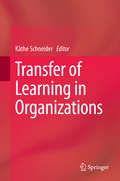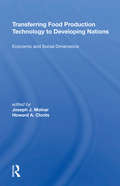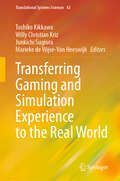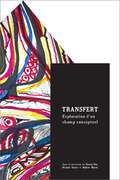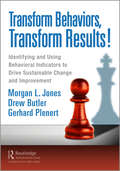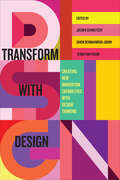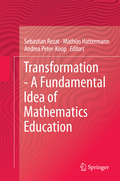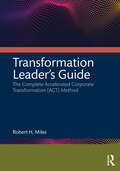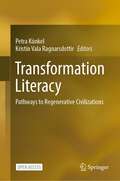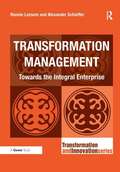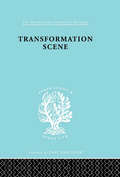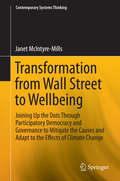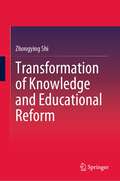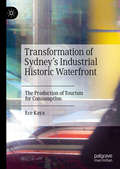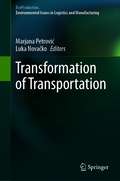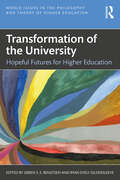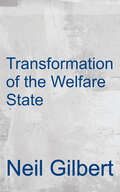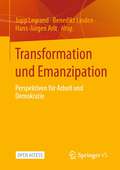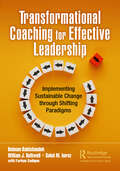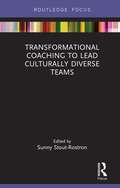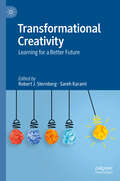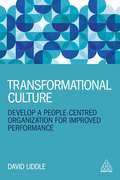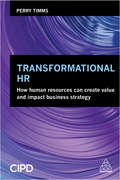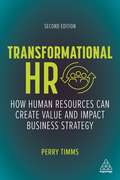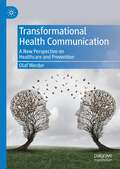- Table View
- List View
Transfer of Learning in Organizations
by Käthe SchneiderIn this book, internationally respected scholars from the disciplines of educational science, business administration and psychology thoroughly discuss practice-related questions on learning transfer in organizations. Readers will learn solid concepts for securing and evaluating learning transfer. This volume offers new insights about learning transfer in organizations and their implications for both research and practice. It examines the actual state in practice and provides the foundation for improvements in the design and evaluation of further training measures that are conducive to the transfer of learning. In addition, coverage details theoretical models on learning transfer in further vocational training and develops concepts that enable the transfer of learning for further training in organizations. The book also evaluates further training measures on different levels on the basis of relevant criteria.
Transferring Food Production Technology To Developing Nations: Economic And Social Dimensions
by Joseph J MolnarThis book explores the social, economic, and policy problems associated with introducing new agriculture and aquaculture technology to developing nations as a means for expanding food supplies and increasing well-being. The contributors examine three general facets of planning for technology transfer and consider methodologies that enable effective
Transferring Gaming and Simulation Experience to the Real World (Translational Systems Sciences #43)
by Willy Christian Kriz Toshiko Kikkawa Junkichi Sugiura Marieke de Wijse-van HeeswijkThis book focuses on how to connect the gaming experience to the real world. Looking back at the history of the Simulation and Gaming field, it has offered the solution to social problems such as policy making, decision making for business strategies, education and training, environmental issues, urban planning, or disaster awareness. In other words, Gaming Simulation always has had a close connection to the reality. The interconnected modern societies nowadays have become even more complex and ambiguous, as the UN SDGs goals show. Gaming is one of the suitable tools to suggest ways to achieve our goals in a world of uncertainty. Learning starts by experiencing games and their effects in a safe environment. An important part of the gaming simulation process are methods for a transfer of the game-based learning to and an application within reality. However, connecting the experience to reality is not always facile for all the participants, no matter how comprehensive the debriefing is. In addition to debriefing, further transfer methods and conditions have to be implemented in order to create a real change of behavior and systems. The book's authors tackle the challenge by introducing concrete practices and offering various hints for readers struggling to solve a similar issue. In addition, when applying the experience of gaming, we have to carefully consider several ethical issues, which are also covered in this book.
Transfert: Exploration d’un champ conceptuel (Transferts culturels)
by Pascal Gin Nicolas Goyer et Walter MoserL’ouvrage propose trois axes de réflexion sur le concept de transfert. Dans la première partie du volume, Hans-Jürgen Lüsebrink évoque les changements contemporains qui augmentent les communications interculturelles. Walter Moser examine l’histoire des concepts et explore la possibilité de faire du « transfert culturel » un instrument qui permettrait de rendre compte de la grande mobilité culturelle que nous observons de nos jours à l’échelle mondiale. Pierre Lévy donne à cette exploration conceptuelle la plus grande amplitude en la déplaçant vers le domaine général du transfert des informations. La deuxième partie, « Le transfert et les savoirs », occupe le gros de l’ouvrage. Daniel Simeoni y explore la traductologie en documentant le parallélisme des concepts de traduction et de transfert. Dans la psychanalyse, tant comme site du savoir que comme pratique, le transfert a une longue histoire conceptuelle; Ellen Corin ouvre pourtant le dialogue à d’autres savoirs et disciplines et évoque la possibilité de déplacer latéralement les acquis de sa réflexion vers le domaine de l’anthropologie. En matière de droit criminel, Alvaro Pires explore des questions théoriques et méthodologiques du transfert, étayant ses propos d’exemples. Nicolas Goyer fait la distinction entre le « transfert généalogique » et le « transfert migratoire » pour illustrer la nécessité de contester la priorité qu’on a longtemps accordée au transfert intergénérationnel. La troisième partie explore l’imbrication des transferts et des médias. Timothy Murray explore le new media art, où se croisent le politique, le médiaticotechnologique, le psychanalytique et l’interculturel. Wolfgang Ernst s’interroge sur le « transfert » au confluent de l’ethnologie, l’ethnographie, la muséologie, l’histoire et l’analyse des cultures, en regard de la théorie et de l’histoire des médias. L’ouvrage propose trois axes de réflexion sur le concept de transfert. Publié en français
Transform Behaviors, Transform Results!: Identifying and Using Behavioral Indicators to Drive Sustainable Change and Improvement
by Gerhard Plenert Morgan L. Jones Drew ButlerWhen trying to embed changes or new mindsets and behaviors, organizations tend to focus on following a particular methodology rather than clearly defining the underlying behaviors that will deliver the sustainable behavioral change and align the thought processes that drive the behaviors—whether their intent is to continuously improve safety or overall risk management or achieve a sustainable growth and improvement trajectory. The key role of leadership teams is not to deliver results. It is to inspire and own the organizational culture that delivers the expected results. If culture is owned by HR, it is doomed to be another thing leaders have to do on top of their day job. Business leadership teams must oversee defining and managing organizational culture and have HR coach the capability of leaders to cast the right leadership shadow by role modeling the right behaviors, rewarding the right behaviors in their teams, and providing clarity on expectations around behaviors for all leaders and employees. The most challenging part of any performance-improvement implementation is the identification of key behavioral indicators (KBIs). The purpose of this book is to assist with that challenge and make “behaviors” easier to understand and identify. The book defines and describes the importance of focusing on the behaviors necessary for sustainable change rather than focusing on the tools and methodology behind change management. It discusses multiple lenses of change including Lean, Six Sigma, Agile, Risk, and Customer Experience and also addresses the weaknesses of complying solely with the methodology and tools. It proposes a behavioral framework to suit each particular lens. This book begins with reasons most continuous improvement programs fail to deliver the expected results. More importantly, it discusses embedding the newly described mindsets and capabilities into the business. The book concludes by providing leaders a roadmap and a coaching framework for how to align and embed their new behavioral framework at all levels, starting from the front-line worker up to the CEO. Essentially, this book leads the reader through the process of understanding the concept of defining behaviors and the difference between them and tools/methodology. It introduces KBIs for leaders to define and drive the desired behaviors at all levels. This will increase the probability of sustainability for the improvement initiative by focusing on and maturing the behaviors these initiatives are trying to drive.
Transform with Design: Creating New Innovation Capabilities with Design Thinking
by Jochen Schweitzer Sebastian Fixson Sihem Benmahmoud-JouiniDesign thinking is widely recognized as an alternative approach to innovation, but it can be challenging to implement, often conflicting with organizational structures, cultures, and processes. The practice of design thinking calls for a new mindset that moves past conventional approaches to innovation, and embraces ambiguity, risk-taking, and collaboration. Transform with Design presents examples of creative organizations across industries and geographies, and recounts the stories of how they adapted design thinking to build their innovation capabilities. Written by leading industry experts and design-thinking scholars, the book features ten anecdotal experiences by professionals who detail the implementation of design thinking as it unfolded for them. Contributors share how they navigated the many barriers and obstacles they encountered along the way and describe their experience from early beginnings to the present, revealing valuable lessons for anyone who finds themselves in a similar situation. Providing a rich tapestry of examples, anecdotes, and lessons that place design thinking in perspective, Transform with Design is for innovators interested in learning how design has transformed organizations while also gaining a current perspective on what others are doing in their field.
Transformation - A Fundamental Idea of Mathematics Education
by Sebastian Rezat Mathias Hattermann Andrea Peter-KoopThe diversity of research domains and theories in the field of mathematics education has been a permanent subject of discussions from the origins of the discipline up to the present. On the one hand the diversity is regarded as a resource for rich scientific development on the other hand it gives rise to the often repeated criticism of the discipline's lack of focus and identity. As one way of focusing on core issues of the discipline the book seeks to open up a discussion about fundamental ideas in the field of mathematics education that permeate different research domains and perspectives. The book addresses transformation as one fundamental idea in mathematics education and examines it from different perspectives. Transformations are related to knowledge, related to signs and representations of mathematics, related to concepts and ideas, and related to instruments for the learning of mathematics. The book seeks to answer the following questions: What do we know about transformations in the different domains? What kinds of transformations are crucial? How is transformation in each case conceptualized?
Transformation Leader’s Guide: The Complete Accelerated Corporate Transformation (ACT) Method
by Robert H. MilesSure to become the definitive guide for leaders facing the challenges of rapid enterprise-wide transformation, this book is the first detailed release of Robert H. Miles’s proven Accelerated Corporate Transformation process – the ACT Method. Many books on corporate transformation exist, often focusing on leadership styles and stories. This business manual goes further and deeper, providing frameworks, tools, and templates, to show what, when, and how a leader of enterprise-wide transformation should pace an organization through the essential transformation phases of Launch, Cascade, and Execute. The ACT approach is leader-led at all levels. It rapidly engages all employees and has reliably generated rapid breakthrough results across a wide variety of executive leaders, organizational types, and transformation challenges. Complemented by an optional online course, this Guide will be an indispensable resource for anyone leading or supporting a rapid transformation in their organization. Line managers, strategy consultants, learning and development professionals, human resources managers, and anyone interested in the inner workings of top leadership circles will appreciate the insights this book provides. The Guide is also available as an online course, Transformation Leader’s Guide: The Online Course.
Transformation Literacy: Pathways to Regenerative Civilizations
by Petra Künkel Kristin Vala RagnarsdottirThis open access book brings science and practice together and inspires a global movement towards co-creating regenerative civilizations that work for 100% of humanity and the Earth as a whole. With its conceptual foundation of the concept of transformation literacy it enhances the knowledge and capacity of decision-makers, change agents and institutional actors to steward transformations effectively across institutions, societal sectors and nations.Humanity is at crossroads. Resource depletion and exponential emissions that not only cause climate change, but endanger the health of people and planet, call for a decisive turnaround of human civilization. A new and transformative paradigm is emerging that advocates for regenerative civilizations, in which a narrative of systemic health as much as individual and collective vitality guide the interaction of socio-economic-ecological systems. Truly transformative change must go far beyond technical solutions, and instead envision what can be termed ‘a new operating system’ that helps humankind to live well within the planetary boundaries and partner with life’s evolutionary processes. This requires transformations at three different levels:· Mindsets that reconnect with a worldview in which human agency acknowledges its co-evolutionary pathways with each other and the Earth.· Political, social and economic systems that are regenerative and foster the care-taking for Earth life support systems.· Competencies to design and implement effective large-scale transformative change processes at multiple levels with multiple stakeholders.This book provides key ingredients for enhancing transformation literacy from various perspectives around the globe. It connects the emerging practice of stewarding transformative change across business, government institutions and civil society actors with the most promising scientific models and concepts that underpin human action to shape the future collectively in accordance with planetary needs.
Transformation Management: Towards The Integral Enterprise
by Ronnie Lessem Alexander SchiefferTransformation management, argue the authors of this inspirational book, now provides the opportunity for the application of the first significant world-wide innovation in the way we manage since Drucker put management itself on the map in the 1950s. In a book that draws on seminal theses and practical examples from the four corners of the world, Ronnie Lessem and Alexander Schieffer provide leaders, students of leadership, managers and change agents with a trans-culturally tested, integrated approach to leadership and management.
Transformation Scene: The Changing Culture of a New Guinea Village (International Library of Sociology)
by Ian HogbinFirst published in 1998. Routledge is an imprint of Taylor & Francis, an informa company.
Transformation from Wall Street to Wellbeing
by Janet Mcintyre-MillsTransformation from Wall Street to Well-being: Joining up the dots through Participatory democracy and governance to mitigate the causes and adapt to the effects of climate change addresses accountable leadership, supports collective interests, ethical governance and fairness to future generations in order to develop systemic approaches relevant to these issues. The humanistic focus, whilst central, addresses how we see ourselves in relation to the environment. It explores cultural perspectives in developed and developing parts of the world where people have a closer connection with the natural environment in comparison to those who live in cities. Furthermore the book discusses participatory action research to prefigure a means to hold the market to ensure that the use of resources that are necessary for the common good are accessible and equitable. The essential systemic aim this book offers is to balance human needs with nature. The research summarizes the discourses and the adaptive praxis in order to develop a bridge between cosmopolitan ethics and cosmopolitan governance. It does this in the interest of supporting and using cultural designs for living that support quality of life and spans five core domains as explained by the author. Overall, this monograph helps evaluates the extent to which the introduced approaches enable the community to consider their perceived assets and risks and the implications of their consumption choices.
Transformation of Knowledge and Educational Reform
by Zhongying ShiThis book defines the concept of knowledge transformation, describes the historical process of knowledge transformation, and analyses its deep influence on education theory and practice by virtue of multiple discipline resources. The general scope of this book encompasses the philosophy of education, curriculum studies, and education reform research. It enables readers to understand how 'hidden' epistemological factors have changed or reshaped the education system throughout history and at present.
Transformation of Sydney’s Industrial Historic Waterfront: The Production of Tourism for Consumption
by Ece KayaThis book examines the impacts of tourism-led transformations on the industrial historical waterfront at Darling Harbour and The Rocks in Sydney, Australia in the context of urban restructuring and deindustrialisation. The book also offers an extended reflection on the paradoxes between tourism and heritage. This discussion is not a new concept. However, this book critically explores the significance of the industrial heritage assets of these areas and the implications of the transformation procedures. Although Darling Harbour and The Rocks have generally been considered success stories of transformation with mixed touristic, recreational, residential and commercial activities, this book examines and evaluates how industrial history and heritage values have been affected. It demonstrates that tourism/leisure-led developments create urban landscapes in which cultural identity and historical assets are sacrificed and/or reinvented.
Transformation of Transportation (EcoProduction)
by Marjana Petrović Luka NovačkoThis book features original scientific manuscripts submitted for publication at the International Conference – The Science and Development of Transport (ZIRP 2020), organized by University of Zagreb, Faculty of Transport and Traffic Sciences, Zagreb, and held in Šibenik, Croatia, from 29th to 30th September 2020. The conference brought together scientists and practitioners to share innovative solutions available to everyone. Presenting the latest scientific research, case studies and best practices in the fields of transport and logistics, the book covers topics such as sustainable urban mobility and logistics, safety and policy, data science, process automation, and inventory forecasting, improving competitiveness in the transport and logistics services market and increasing customer satisfaction. The book is of interest to experienced researchers and professionals as well as Ph.D. students in the fields of transport and logistics.
Transformation of the University: Hopeful Futures for Higher Education (World Issues in the Philosophy and Theory of Higher Education)
by Søren S. E. BengtsenTransformation of the University imagines preferable futures for the university, building hope for the institution’s necessary transformation. It transcends old criticisms and presents fresh ideas on how the institution might be conceived, organised and put into practice while safeguarding that which makes it a university – the pursuit of knowledge. This book is divided into three main parts: Part One – ‘Knowledge’ assumes the role of the university in generating knowledge for the benefit of society; Part Two – ‘Cultural Growth’ expands on how the university might contribute to and benefit from the cultural growth of society, with both explicit and implicit connections to social and epistemic (in)justice; and Part Three – ‘Institutions’ focuses on imaginative processes for enacting the university as an institution that meets the unforeseen future challenges facing societies around the world. With contributions from scholars across the world, Transformation of the University is an essential read for all academics, practitioners, institutional leaders and broad social thinkers who are concerned with the future of the university and its contributions to society.
Transformation of the Welfare State: The Silent Surrender of Public Responsibility
by Neil GilbertSince the early 1970s, debate has raged over the "crisis of the welfare state." As the United States successfully exported its bootstrap brand of capitalism and an ever-broadening range of public activity came to be viewed through the prism of profit and loss, social welfare policies were closely scrutinized worldwide. Welfare was no longer seen as a means to remedy the inherent flaws of capitalism, but rather was recast as part of the very problem it was designed to solve. At the same time, the glaring systemic deficiencies of extant welfare systems-and the psychological toll of welfare dependency--became increasingly apparent, even to welfare's supporters. How much has really changed in the world of welfare? A great deal, according to Neil Gilbert, one of our most deeply engaged and thoughtful analysts of social welfare policy. <p><p>In this panoramic inquiry, Gilbert spans the globe to assess, in provocative yet dispassionate fashion, what welfare looks like in a free market world. From Sweden to the U.S., Gilbert finds a fundamental transformation in the welfare state--a turn away from broad-based entitlements and automatic benefits to a new, "enabling" approach defined by policies designed to promote privatization and labor force participation. He provides tangible evidence of how these new systems promote work and responsibility over protection and how they thicken the glue of civil society by diluting the pervasive role of government.
Transformation und Emanzipation: Perspektiven für Arbeit und Demokratie
by Hans-Jürgen Arlt Jupp Legrand Benedikt LindenDieser Open-Access-Band fokussiert das „magische Dreieck“ aus Arbeit, Zivilgesellschaft und Politik. Wie diese Drei den gesellschaftlichen Entwicklungen eine transformativ-demokratische Grundrichtung geben können, darauf suchen die Autorinnen und Autoren Antworten. Die Essays reflektieren das drohende Scheitern des Projekts der Moderne, das im Zeichen von Aufklärung und Fortschritt, mit Visionen von Freiheit, Gleichheit und Brüderlichkeit aufbrach. Heute stehen die Nationen, alles andere als vereint, erneut unter dem Eindruck von Krise, Krieg und Katastrophe. Die Bevölkerung sieht sich konfrontiert mit zerstörten Umwelten, Hunger und Flucht, sozialen Existenzängsten in vielen Familien und unermesslichen Reichtümern in wenigen Händen.Die wissenschaftlichen Analysen, schriftstellerischen Exkursionen und politisch-utopischen Skizzen des Bandes wenden sich an alle in Wissenschaft, Politik und Kultur, deren Interesse an engagierten, undogmatischen Diskursen und emanzipatorischen Praktiken ungebrochen ist.
Transformational Coaching for Effective Leadership: Implementing Sustainable Change through Shifting Paradigms
by William J. Rothwell Sohel M. Imroz Behnam BakhshandehThe purpose of this book is to introduce the concept of transformational coaching and to educate professional business coaches or mangers-as-coaches in their organizations on the influential and relevant elements of Transformational Coaching for Effective Leadership designed for coaching individuals, teams, and businesses or applying such elements in any level of organization development intervention, either toward individuals, teams, groups, departments, or the organization itself. Given the power and long-lasting influence of transformational coaching, it also could be beneficial to professionals in the fields of human resource development (HRD), workplace learning and performance (WLP), human performance enhancement (HPE), and, overall, in the domain of workforce education and development (WFED). This book will start by reviewing the background and presence of transformational coaching in businesses and organizations, along with the general concepts, perceptions, and understanding of coaching. _ is book will examine the uses of transformational coaching in management and leadership development, human resource development for talent development and retention, and for developing managerial coaching skills and competencies. Additionally, this book will review the presence and use of transformational coaching concepts, theories, and practices, including transformational learning for human resources (HR) and HRD professionals to influence a workforce’s attitude, behavior, and productivity. Features Builds individuals’ self-awareness, self-realization, and self-confidence Offers personal and professional development Teaches the concept of transformational learning and its use in transformational coaching Teaches rituals, skills, and strategies for individuals and teams to increase their productivity Offers an approach to building healthy and strong relationships with oneself and others Includes change management strategies for redirecting poor job performance Helps readers implement effective transformational coaching practices by offering many tools, such as forms, checklists, and worksheets
Transformational Coaching to Lead Culturally Diverse Teams (Routledge Focus on Coaching)
by Sunny Stout-RostronIn this book, Dr Sunny Stout-Rostron examines real-world experience and the contemporary literature on group and team coaching. She analyses how team coaching can guide coaches to help leaders and teams flourish in complex, culturally diverse organisations. As well as presenting a variety of team coaching models she also presents her own model, High-Performance Relationship Coaching, the result of many years of working with global corporate teams. Dr Stout-Rostron illuminates how team coaches can help teams to learn from and interpret their own experiences, and to understand the complexity of the environment in which they work. Her team coaching model is explored over eight chapters, beginning with the role of the business team coach and leadership coaching processes. She evaluates how to work in the Fourth Industrial Revolution and how to shift culture through transformative leadership coaching, explains the depth of relationship systems coaching, and explores how to apply a variety of methods including Ubuntu coaching. The book encourages team coaches to develop deep self-awareness, team awareness, cultural diversity awareness and wider systemic and relationship awareness. Filled with practical stories and examples, it describes how to work successfully with these models in the real world. Transformational Coaching to Lead Culturally Diverse Teams is a key guide for coaches in practice and in training, HR and L&D professionals and executives in a coaching role. This is essential reading for all team coaches.
Transformational Creativity: Learning for a Better Future
by Robert J. Sternberg Sareh KaramiThis edited volume brings together leading scholars in diverse disciplines to share their best thinking on how creativity can be conceived of, taught for, and deployed to serve rather than undermine humanity. Transformational creativity, as defined in this book, is creativity deployed to make a positive, meaningful, and potentially enduring difference to the world. Transformational creativity is compared to transactional creativity, which is creativity deployed in search of a reward, whether externally or internally generated.
Transformational Culture: Develop a People-Centred Organization for Improved Performance
by David LiddleCompany culture is the foundation of business success. Strong culture drives an average of four times more revenue growth, 12% more productivity and half the employee turnover rate.Driven by global health, economic and environmental emergencies and rising social justice and employee activism, organizations are urgently seeking a new cultural model which will enable them to thrive. Transformational Culture provides a blueprint for a fair, just, inclusive, sustainable, and high performing organization. With a foreword from Dave Ulrich and expert analysis of the benefits of a people-focused and values lead organization, it provides 8 transformational enablers to deliver individual, team and business success. Guidance is also included on how to tackle toxic cultures and behaviours, how to shift the dial from retributive to restorative justice, and how to develop humane and human HR and management systems.The book offers practical guidance for HR professionals and business leaders on how to redefine their culture and to embed a unique, practical framework to assist with the resolution of concerns, complaints, and conflicts at work. Tried and tested toolkits and templates plus case studies from organizations who have successfully implemented this approach including London Ambulance Service, Aviva, The FT and British Retail Consortium are contained within Transformational Culture making this an invaluable guide for anyone wishing to put their people and their values first.
Transformational HR: How Human Resources Can Create Value and Impact Business Strategy
by Peter Cheese Perry TimmsIn our increasingly fast and competitive world, HR professionals are uniquely placed to prepare an organization for lasting success. Pioneers are leading the way using the latest developments in the world of work such as Lean UX, holacracy, futurology and work-as-a-platform. Transformational HR shows HR professionals how to unleash this potential and use these advances to make an impact on business strategy. This book puts transformational HR in context, exploring what has and hasn't worked. It sets out a vision of what HR can be, providing examples of and lessons from HR thought leaders who have begun to transform their workplaces. In addition to presenting numerous examples, Transformational HR provides tools, models and advice for HR professionals aspiring to become more finely-tuned, responsive, forward-thinking and impact-led. Featuring case studies and references from companies from the USA, Mexico, Slovenia and the UK, it is a blueprint for turning the HR function into a powerhouse for organizational success and creating more fulfilling experiences for people.
Transformational HR: How Human Resources Can Create Value and Impact Business Strategy
by Perry TimmsUnderstand and use the latest developments to make an impact on business strategy as well as create a fair, inclusive and progressive working environment with this fully revised second edition of Transformational HR.This is the practical guide professionals need to unlock HR's potential as a powerhouse for organizational success, putting transformational HR in context, exploring what has and hasn't worked until now, and setting out a vision of what HR can be. Alongside critical discussion of the latest developments and business models, including agile and humanist ways of working, Transformational HR provides tools and advice for HR professionals aspiring to become more responsive, forward-thinking and impact-led. This updated edition features brand new case studies from companies who have adopted these models and transformed their workplaces, with examples from all sectors where organisations and their HR teams have used this book as inspiration. It is a blueprint for enabling the HR function to be a driving force for organizational success and create more fulfilling experiences for people.
Transformational Health Communication: A New Perspective on Healthcare and Prevention
by Olaf WerderThis book advances our understanding of communicative relationships and key barriers to more effective health communication. In this, it offers a humanistic orientation of health communication as well as its social, cultural, political, ethical, and spiritual dimensions and contexts. The book therefore brings a more inclusive and integrated approach to the major challenges and opportunities in contemporary health, medicine, and wellbeing.
